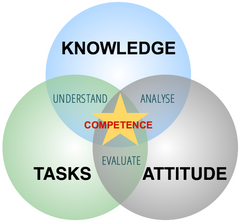Competency-Based Training is a way to teach concrete skills. Every individual skill or learning outcome (the competency), while part of a larger educational or training goal, is a single learning unit, to be worked on one at a time. The level of competency is determined by the organization requiring the training, and the learner is evaluated on each competency. Learning modules can be skipped if the learner can prove -- through prior learning assessment (PLAR) or challenging a test -- that they have already mastered the competency level required.
 Competency-based training is learner‑focused, and lends itself to independent study, allowing learners to study at their own pace, reviewing or practising challenging learning outcomes as they need, and moving quickly through the competencies in which they are more adept.
Competency-based training is learner‑focused, and lends itself to independent study, allowing learners to study at their own pace, reviewing or practising challenging learning outcomes as they need, and moving quickly through the competencies in which they are more adept.
As competency-based training requires mastery of each learning outcome or skill, it is well suited to business and corporate training, where many skills and abilities need to be assessed separately. Most other learning methods use ‘summative’ testing – meaning that a student who has 80% in an evaluation that covers many subjects may have an 80% mastery of all learning outcomes or may have no mastery at all of 20% of the learning outcomes. Summative testing allows the student to move on to higher learning while missing some abilities that will be crucial to that higher learning.
‘Mastery’ of a competency depends on the depth of knowledge required of the learner. In the model followed by Blue House Energy and PHBI for the trainingOntario program developed for Tarion, the depth of knowledge is broken out into four distinct levels:
|
Level 1: Recall/Reproduction |
The learner can recall a fact, information or procedure, process information on a basic level. (Key terms = know/remember, comprehend/understand) |
|
Level 2: Skill/Concept |
The learner can use information or conceptual knowledge to execute and implement procedures to complete a task. (Key terms = apply) |
|
Level 3: Strategic Thinking |
The learner can use reasoning to develop a plan or sequence of steps with some complexity. (Key terms = analyze, evaluate) |
|
Level 4: Extended Thinking |
The learner can investigate, think through and process multiple conditions of the problem. (Key terms: synthesize, evaluate) |



